Good morning,
Among the many responsibilities a working professional must balance, perhaps the one that affects us most deeply is caring for elderly parents. As parents age, they begin to lose mobility—everyday tasks become an ordeal. Things we take for granted—ordering groceries, using apps for services—is beyond them. Health issues make them frail and they require constant medical intervention. Then there’s the whole concern around loneliness and isolation—especially if circumstances have taken you to a different city and they live by themselves.
The pandemic and its attendant restrictions brought all of this in sharp relief over the past year.
Senior citizens are particularly vulnerable to mental stress—Covid is impacting them way more than we are willing to accept, Dr Siddika Panjwani, neuropsychologist at Lilavati Hospital, points out in this 10-minute audiogram.
She talks about some of the ill effects she’s seen of the reduced social interactions, and offers perspective on why this happens and a few hints on how to manage this radical change. “In trying to protect our elderly, are we causing them more harm?” she asks.
We asked people in our network for their lived experience in caring for elders. Our brief to them asked, how have you coped? What concerns did you have to solve for? What resources did you tap into? And what are you learning as a caregiver—what is changing for you?
Here are their unique perspectives on
- Providing care for a parent who lived alone in a different city, and taking care of a mother-in-law who felt ‘alone’ in a new place.
- Handling a long spate of illnesses when little help was available, and being mindful of their autonomy and quality of life (and your own too).
“You are never too old to set another goal or to dream a new dream.”
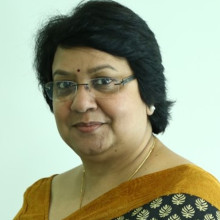
By Rumjhum Chatterjee
In the sunset years of one’s life, I wish every senior citizen in the family could wear this attitude! We have been lucky to see our mothers (my mother and my mother-in-law) adapt themselves and embrace a new way of life.
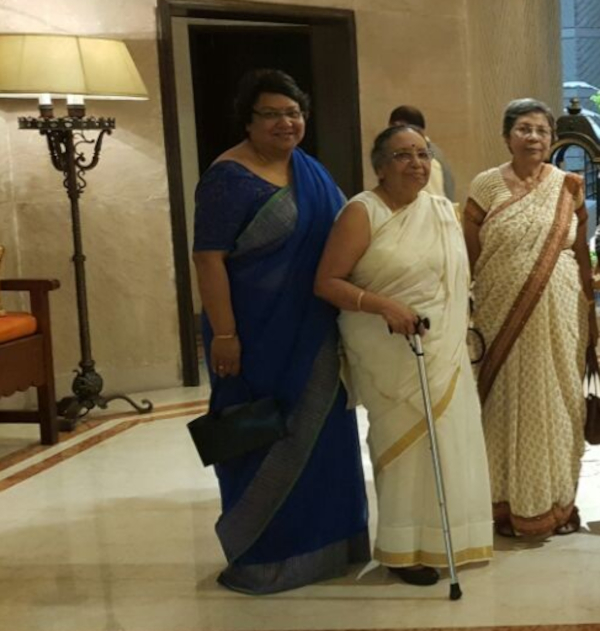
(With my two mothers)
My mother lived alone in Kolkata for four-and-a-half years post my father’s passing in 2015. She was firm that she did not want to relocate to cities where my brothers and I lived and remained confident of managing on her own. Thankfully, she lived in an apartment complex where she had many friends and our large family still had many relatives in the city, although most of them were aged or aging. Part time and full-time domestic help in the city is still available in plenty but relying on them alone can be a matter of luck. Fortunately for us, in early 2016 we chanced upon a young group of doctors and practitioners who had just launched an agency, Care Continuum, to provide home care for the elderly. Not just medical care but also ‘living assisted care’ for day-to-day wellbeing. We signed them on for my mother amid huge protests and chiding. “I am not sick. I am not so old that I cannot look after myself. Why are you wasting your money?” we heard her say. It took some doing to convince her that from afar, we would be mentally at peace knowing that she has reliable help if she should need it.
The team from Care Continuum were outstanding, to say the least. From weekly medical check-ups, setting up appointments with doctors and escorting her for them, monitoring her medicines and follow ups—they were such a boon. But the icing on the cake was the millions of ways in which they ‘assisted’ my mother without her realising it. How did that happen? What about the initial resistance and rejection of such services? Hats off to Care Continuum, they patiently worked on her for over three months to finally win her acceptance and trust. It was a sort of victory when during my daily 20-minute phone calls with my mother I heard her talking about the Care Team. Thereafter, it was a cake walk, and significant peace of mind for us in Gurgaon, Noida and Mumbai.
My mother was an outstanding cook and loved to feed people. She also enjoyed gardening and her terrace garden was her pride. The Care Continuum team fanned her interests in their own special ways, but also helped her to ‘unshackle’ herself and learn myriad new things. Moving from a basic cell phone to a smartphone to conversing with her children and grandchildren on WhatsApp and Facebook; from hiring private taxis from the neighbourhood car rental company to ordering a ride with Ola and Uber; from giving up going to a movie hall (who will go to ‘cut’ the tickets?!) to buying online tickets for herself and her friend; from physically updating bank passbooks to requesting for bank statements online; and setting up food stalls at community events and appearing for interviews with the press and participating in panel discussions for TV channels. It seemed she had begun to live her life and forget her age.

(My mother at the movies with a friend)
Till her end came in late 2019, had it not been for the team at Care Continuum and their deeply caring service, my mother would not have enjoyed the quality of life she did. For me, while I reconciled to her peaceful passing, I felt the vacuum every morning as I adjusted to doing something other than talking to my mother for 20 minutes.
My mother-in-law, in 2017, relocated from Kolkata to live with us in Gurgaon after my father-in-law’s passing. Many things were new for her—the geography, the climate, the language spoken, no friends or extended family members. And with our punishing work schedules and travel, she was having to contend with being ‘alone’ in a new place!
Before her arrival, we scouted around for domestic help who would speak in Bengali even if they were not the most efficient of resources. That having been settled, we set about to find ways to keep her occupied with some activities and her mind engaged intellectually. Unfortunately, there was not a Care Continuum equivalent in this part of the country!
But in our neighbourhood, there was a school being run by an NGO for children of the economically weaker section of society. The principal and the faculty members were wonderful people and welcomed my mother-in-law as a volunteer for the school. That took care of three half days every week. The joyful stories at the dining table every night were centred around tiffin sharing, library books and class interactions. Children have a wonderful way of adding cheer in one’s life and my mother-in-law was not untouched. However, the transition from being a professor and delivering lectures on political science and economics to storytelling for Class 2 and 3 students, in English mixed with Hindi can be a tough act! But refreshingly different as my mother-in-law claims.

(My mother-in-law with kids at the school she volunteers with)
We also happily discovered that the Ramakrishna Mission was starting a Study Circle in Gurgaon. A lot of the elders in our two families are closely associated with the Mission and so this came as a very welcome move. My mother-in-law began to spend most Saturday evenings at the Centre and that gave her the opportunity to interact with another set of like-minded people.
In March 2020, we were dealt with two blows! My mother-in-law was diagnosed with breast cancer. It was at an early stage, but surgery was recommended immediately. The pandemic was also raging in the country and the lockdown was imminent. We brought her home after the surgery along with a nurse from the hospital a day before lockdown was imposed. We asked our part time domestic retainers to stay home and look after themselves and reduced any interactions of those at home with outsiders.
Life changed—for us, as it did for every family. Work had to go on and the business had to be managed, but from home. The household had to be run without stepping out and dependence on online groceries grew. With helping hands demobilised temporarily, the boundaries of work and home were beginning to blur. And to top it all, we had a medical condition and nursing and medication to attend to. In all of this, while we can be accused of being high strung and trying to manage the best we can, my mother-in-law was her calm and unflappable self. She made no demands and accepted everything gracefully.
It was also helpful to have the youthful nurse around as she not only took care of my mother-in-law’s medical needs, but she also kept her in good spirits and provided much-needed company. The evening Ludo sessions were a laugh riot just before dinner! I believe there were also dancing classes and some hair styling and makeovers too! Since the lockdown continued for longer than we had initially imagined, the nurse continued with us. We are thankful for the time she gave us.
My mother-in-law made a good recovery from the surgery. With the fear of the pandemic continuing, we now needed to find new ways of keeping her engaged. Art and craft! Painting kits and some wool and knitting needles. My mother-in-law has kept herself busy and in the last few months she has painted a beautiful canvas which now hangs in her bedroom, has decorated pebbles and stones, and has almost finished knitting a full-sized colourful blanket.
The Zoom parties for birthdays and other events in the last one year have also provided us a way to stay connected with family and friends and my mother- in-law has taken to that medium too like a fish to water.
Today she gets her first jab—and in the weeks and months ahead, I am sure she will feel more confident to step out and meet people.
While the pandemic may hopefully be over soon, the issues of elder care are here to stay. And, as a society there is so much that we must do. If only there could be more agencies like Care Continuum in every city! If only there could be good quality old age homes where people who do not live in the country can arrange for their parents to live in without feeling guilty. If only…
For the last nine years I have been closely associated with HelpAge India, one of the largest and most credible NGOs that works for the cause and care of India’s disadvantaged elderly in the fields of healthcare, social protection, livelihoods, and advocacy for elder rights. At HelpAge, we strive every year to be able to improve the quality of life for a greater number of elders than we did the previous year. If only we could reach more. If only we could raise more funds to do so…
My two mothers have been exemplary human beings. Makes me wonder how things will change when we approach our sunset years.
(Rumjhum Chatterjee is co-founder at Feedback Infra and serves as its group managing director and head of human capital development.)
Doing it their way
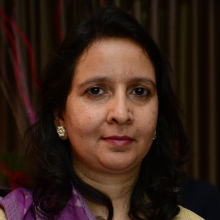
By Sveta Basraon
When their last chick (me) flew the nest in 2000 and moved to Mumbai for work, my parents didn’t balk at being by themselves at age 70 and 63.
All their four children were now in different cities and they saw this as an opportunity to travel. Despite their arthritis and heart ailments. They’d spend some months in Mumbai with me, some with my sister and brothers, wherever they were posted, some in their own home in Noida, and some in our ancestral home in Himachal Pradesh.
They became experts in travelling light and which trains are more comfortable (they preferred trains to flying—sitting still was tiring; in a train they could lie down, walk about, chat up other passengers). When with me, they were the ones who knew the neighbourhood better—who has the best mangoes, which new restaurants to try, which sale to go to, where to get a watch repaired.
Autonomy, involvement and happiness
Then, seven years ago, things began to slow down for them. At 84 and 77, they were tiring sooner, falling sick more often. We persuaded them to finally “retire” in Noida, and move to a new apartment complex with lifts, a garden, and a grocery and drugstore inhouse. This neighbourhood, because we have at least five good hospitals within a 10-15-minute drive radius.
My brothers had retired and had moved to Noida as well, and I too got a job in Delhi.
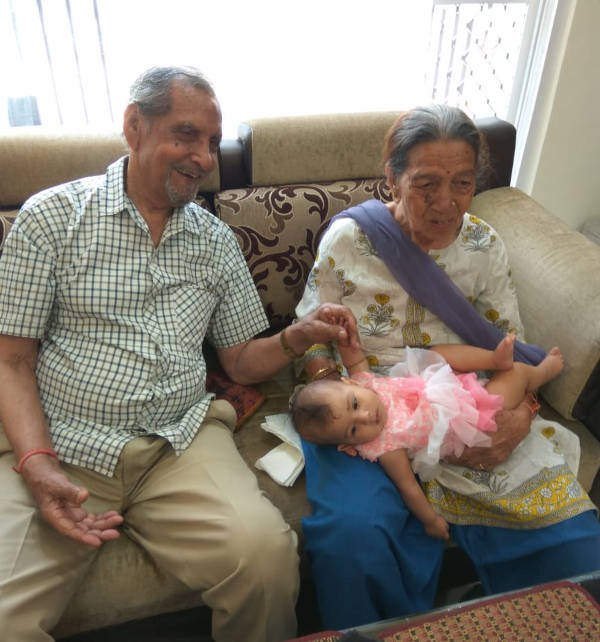
(With their great-granddaughter, a couple of years ago)
All good on paper. But my mother hated it. I’d come home on weekends and she’d say “I am bored. I miss my friends.” I talked to her about taking charge. “Just go and sit on that bench in the garden. See what happens.”
And that very day, she made three new friends.
They quickly settled to a new routine. Dad would walk down to the store every morning for eggs, bread, milk; mom would go for her slow walk and chat with her friends—now a group of nearly a dozen—every evening. Every Tuesday, she’d drag her shopping trolley to the weekly vegetable market just outside the gate. She’d come home with all kinds of news about what’s happening in the complex.
There were a few hospitalisations and by now I’d moved in with them. But they refused any “help” with these chores. “We meet our friends there. We like it. Let us.”
After an episode of debilitating back ache, my mother was diagnosed with severe osteoporosis and a very high risk of fractures. I whined to her doctor that she insists on going to that weekly market. “She doesn’t listen to me. If I say I’ll order vegetables online, it becomes a battle of wills.”
What he said to me then has changed my outlook on how we need to care for elders. And it helped me cope with the crises that would fall on us as soon as the lockdown came into effect last March.
“Her quality of life is more important,” he said. “You don’t know whether she’ll live one year or 10. Don’t stop her. Take a few precautions and let her do what she clearly enjoys.”
Simple advice, though not easy to follow.
The pandemic and the pandemonium of the past year
I was learning to let go, be a little fearless myself. Worry less, and enjoy their enjoyment.
Then a few days after the lockdown, with so much uncertainty all around, my mother had an episode of vertigo and fell in the bathroom. It was past midnight. My panic abated somewhat when I spoke with Dr Debashis Bhattacharya in London, where it was daytime—my boss, Indrajit Gupta connected me to him. And in the morning, I was able to consult her orthopedic doctor on video. He guided me on how to check for a hip or spine fracture (there wasn’t one; but an x-ray later would show a compression fracture on the spine) and gave a prescription for pain management. (I remember telling my colleague NS Ramnath that it felt like I was being guided to land a crashing plane.)
That two-month fight last April and May taught me much. She needed assistance even to turn in bed; there was no outside help available—no domestic help and no visits to the hospital. And there was my dad’s worry too. Then 90, he was feeling helpless and in panic, exacerbated by the dire news about the pandemic.
I found online tutorials on how to assist a patient with reduced mobility, without hurting myself (here, here, here, and here). I read up on how to feed someone who may choke. I learnt to observe what’s going on with my dad because he wouldn’t tell me to spare me further worries.
Through the year, my mother suffered many setbacks—another episode of vertigo; another fall early in the morning due to low sodium; a lung infection and respiratory failure; and yet another fall again due to low sodium.
But by now the hospitals had set up safety protocols and we were able to get her proper treatments. Though we’ve avoided getting an attendant at home because with two elders and with my mother’s still frail health, the risk is simply too high.
I found my own system for managing my mother’s medication. The 7-day pill box wasn’t working for me, because her medication would change based on her condition. At one time there were nine medicines and two respules to be used with a nebuliser at varying frequencies. My system is to consult a time chart. And have separate, properly labelled boxes for each time slot. This way, if some medicine is to be discontinued, I can easily identify it. And I note her progress in a diary.
How we’ve coped and what we’ve learnt
Give them the control, but learn to stand firm too: The first thing I’ve internalized is that doctor’s advice on quality of life. If it makes my dad feel better when he makes tea and breakfast for us, let him do it. There’s no room for guilt about “having an elder do chores.” (My foodie father has perfected his chicken recipe over the years, with tips from my mother. He takes great joy in serving it up. And every time he cooks, he invites the whole family.)
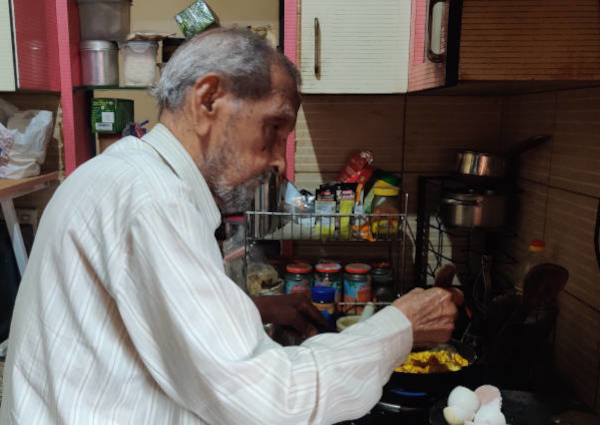
(Making breakfast)
And if my mother wanted to sit in the balcony even when it was cold, I’d simply bundle her up, put a chair out for her and let her enjoy the garden from her perch for as long as she could. The caveat of course is that she shouldn’t if it’s really cold. So rather than saying an outright no, I’m learning to negotiate—that she can sit inside by the closed French window; or when the sun is out. It’s working better now that she sees that we are not saying no all the time.
Solve for boredom; change the scene; have things to look forward to: One brother takes mom out for a “picnic” to his home when she’s up to it, or brings her milder versions of foods she enjoys that my sister-in-law makes for her; the other takes her “for a spin” on her wheelchair. My sister calls her every day. And we got her a Saregama Carvaan Mini radio—it was an instant and profound morale booster for her! Both my parents are now looking forward to the vaccine so they can go for their walks soon. And maybe visit our ancestral home in summer.

(Home-picnic with my brother)
Keep interest alive; get them to explore things: In the early months, we had turned off TV news—it was only adding to the panic. Newspapers were out too in the early days of the lockdown. So, we downloaded a couple of news apps on my dad’s phone. He’s “gone digital” now and reads a lot on that medium, though the newspaper habit hasn’t gone away. For my mother, we started by reading a Hindi newspaper aloud to her; she’s now well enough to sit up and read it by herself.
Look beyond your assumptions: We thought we knew that mom’s back pain was because of her arthritis and osteoporosis—and we had SOS pain medication for that. As for her chest pain, her ECG was fine so we weren’t worried. But this time, back and chest pain were due to lung problems. We were lucky to catch it early. The biggest lesson is, go to a good physician, get it checked. He will direct you to the right specialist. Don’t assume anything!
Look out for your own health: Like the airline safety instruction says, put on your oxygen mask before assisting others.
If I don’t have 30 minutes for a walk in the morning, no worries, I do this 7-minute standing workout in the pockets of time I find. I also bought myself a fitness band (Mi Smart Band 5). The daily stats prod me to get moving, and I’ve set up an alert for every hour of inactivity—when it buzzes, that’s my cue to at least stand up from my seat, look out the window and stretch a little.
I needed to handle my stress as well. There were days when I’d be exhausted but my mind would be racing and I’d be unable to sleep. Earlier fixes like reading or meditation were not working. So, on a friend’s advice, I took up knitting a few rows every night. I found that when my fingers were moving, my mind was still.
Let it out once in a while: It’s ok to feel frustrated and weary sometimes. I learnt that from friends who are in a similar life stage and with aged parents, some of them seriously ill. I write it down on scraps of paper to get it out of my system—and then tear it up into tiny pieces. It works for me and I return with a better frame of mind.
(Sveta Basraon is Head of Operations at Founding Fuel)
Role reversal

(Via WhatsApp)
Tell us what you think and find noteworthy.
And if you missed previous editions of this newsletter, they’re all archived here.
Bookmark Founding Fuel’s special section on Thriving in Volatile Times. All our stories on how individuals and businesses are responding to the pandemic until now are posted there.
Warm regards,
Team Founding Fuel


